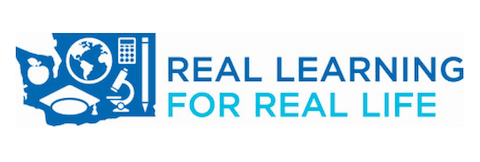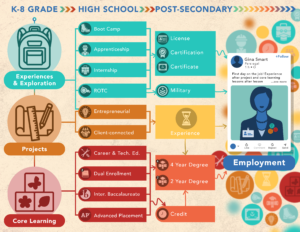Real Learning for Real Life

The digital learning revolution is a bigger deal than the printing press five hundred years ago–and it will occur over one generation rather than a century. The ability to learn anything anywhere anytime is changing life options for hundreds of millions of people. Well before the end of the decade, we’ll have tools and schools to offer every young person on the planet a shot at the idea economy (where politics don’t mess it up).
Nearly every state is implementing common college and career ready learning expectations. In almost every case, the new standards are higher and better than the state standards they replace. It will be easier to compare results from state to state.
Most importantly, common standards are like the personal computer twenty years ago or the iPhone five years a giant platform for innovation. Teachers are finally able to share tools and resources across state lines.
The intersection of these two historic shifts is remarkable; daunting on one hand but quite complementary on the other. We need to dramatically boost the percentage of young people prepared for idea economy employment and we can’t throw money at the problem, so we need to focus on the innovation opportunity.
Washington State leaders will gather in Seattle on Tuesday and in Spokane on Wednesday to consider the implications of these two historic shifts occurring simultaneously. Hosted by Partnership for Learning and Washington Roundtable, the convening will explore the skills gap, new standards, and next-generation learning environments.
Without underestimating the challenge, I’m optimistic that Washington schools (like schools worldwide) have the best opportunity ever to significantly boost achievement–and with the edtech explosion the opportunity set gets better every quarter. I’m excited about:
-
adaptive learning systems that engage students and adjust to their learning level (like Bellevue’s Dreambox Learning);
-
engaging visual ST Math showing success and breaking language barriers in Highline schools;
-
personalized learning environments becoming more common as a result of projects like the one led by the Puget Sound Educational Service District;
-
improving access to higher level courses and electives (offered by course providers like Seattle’s Apex Learning and Giant Campus);
-
breaking the time barrier in high school and college with more competency-based learning options including WGU Washington;
-
more opportunities to learn coding like CodeHS which, according to UW’s Ed Lazowska, “has been looking pretty good to us for an intro course.”
-
better support for principals from groups like Seattle’s Abeo School Change using a social learning network on Edmodo; and
-
improving conditions and career options for educators.
Business role. The transition to higher standards and personal digital learning will be a lot of work. Businesses can help in many ways:
-
Talent development: School districts can learn a lot about talent development from Seattle and Spokane area companies.
-
Student learning: companies can sponsor experiences including job shadows, internships, and field trips.
-
School improvement: support regional initiatives to blend instructional technology and instructional improvement efforts.
-
New school development: with the new charter school law, there are at least 40 new school opportunities in Washington–every one of those schools could use a couple business partners.
-
STEM: companies can sponsor FIRST Robotics, Hacker Scouts, Maker Faire, or a life hacker club.
-
College and career ready advocacy: perhaps the most important role businesses can play is to make the case for high expectations for all students.
Partnership for Learning and Washington Roundtable do a great job supporting effective business involvement in Washington schools. With the shift to digital learning and higher expectations, they need all the help they can get.
For more, see The Business Role in Education: Examples, Expectations & Support.
More information about the local convenings:
Partnership for Learning and the Washington Roundtable invite you to join business and education partners to discuss 21st century education needs in Washington state. We will be hosting two convenings: Seattle on September 10 from 8am-12pm, and Spokane on September 11 from 8am-12pm.
The convening will raise awareness of the 21st century education needs in our state and build support around three critical issues: the skills gap, Common Core State Standards and Assessments and the importance of college- and career-readiness.
To register for the Seattle convening on September 10, click here.
To register for the Spokane convening on September 11, click here.
MIND Research Institute and Dreambox are Getting Smart Advocacy Partners. Edmodo and CoheHS are Learn Capital portfolio companies.






Nicole Tranchina
As a creator of a children's virtual world for learning, I love the steps we are taking with combining the digital world with the educational world.